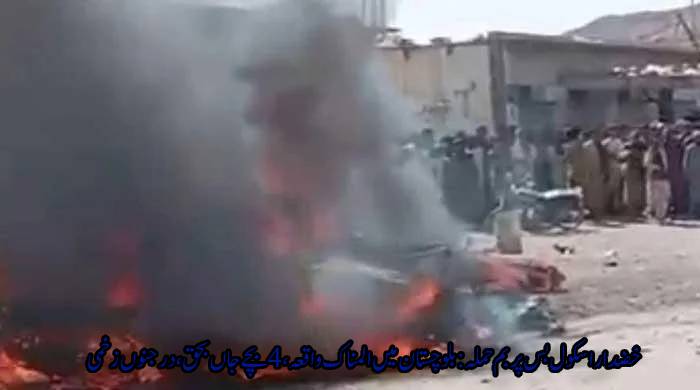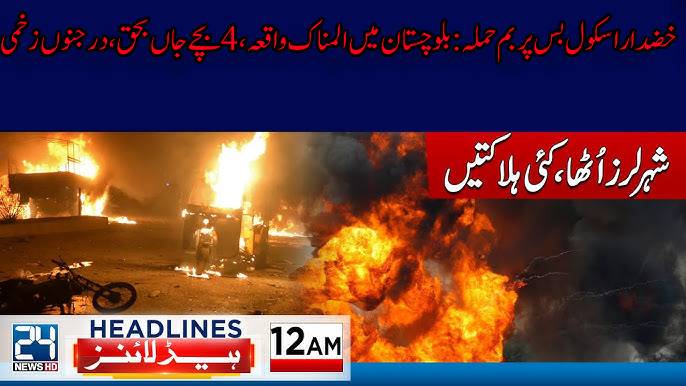On May 21, 2025, a suicide bombing targeted a school bus in Khuzdar, Balochistan, killing four children and injuring 38 others. Authorities condemn the terror attack.
On the morning of May 21, 2025, a horrific suicide bombing targeted a school bus in Khuzdar, a district in Pakistan’s volatile southwestern province of Balochistan. The devastating attack claimed the lives of at least four innocent children and left 38 others injured, some critically. The school bus, belonging to the Army Public School, was en route to pick up students when the explosion occurred near Zero Point in Khuzdar.
The attack has sent shockwaves across Pakistan, triggering nationwide condemnation and renewing concerns about security in Balochistan, a province long plagued by insurgent violence, separatist movements, and terrorism.
Table of Contents
Details of the Attack
According to Yasir Iqbal Dashti, a senior local government official in Khuzdar, the school bus was struck by a suicide bomber during its morning route to collect students. The force of the blast shattered the bus and injured many of the children onboard.
“The bus belonged to the Army Public School and was targeted by a suicide attacker while picking up students early in the morning,” he confirmed. Of the 38 wounded, several were reported to be in critical condition, prompting fears that the death toll could rise further.
Eyewitnesses reported a loud explosion that shook the area, followed by screams and chaos as residents rushed to the scene to help the victims. The bus was visibly torn apart, and debris from the blast was scattered across the road.
Emergency Response and Medical Treatment
Within minutes of the blast, rescue teams and security forces arrived at the site, securing the area and rushing the injured to local hospitals in Khuzdar. Medical staff struggled to stabilize the critically injured victims, with some being transported to larger medical centers for specialized treatment.
Due to the severity of the injuries sustained by several children, authorities expressed concern that the casualty count could increase. Hospital officials worked tirelessly to save lives, and an emergency was declared at all local health facilities to accommodate the sudden influx of patients.

National Reaction and Official Statements
The attack prompted swift and widespread condemnation from government officials, political leaders, and citizens alike.
Interior Minister Mohsin Naqvi released an emotional statement, calling the attack a “barbaric” act of terrorism. “The enemy attacked innocent children with unimaginable cruelty. This heinous attack on a school bus is part of a malicious conspiracy to destabilize the country,” he said.
Prime Minister Shehbaz Sharif also issued a strong condemnation, expressing sorrow and solidarity with the victims’ families. He blamed foreign-backed elements for orchestrating the attack, pointing fingers at hostile intelligence networks allegedly working to foment unrest in Balochistan.
The military issued a formal statement denouncing the bombing as a “cowardly and ghastly act,” vowing to bring the perpetrators to justice. According to military officials, the incident was part of a larger pattern of attacks orchestrated by separatist groups and their alleged foreign backers.
Security Context: Why Balochistan Remains a Target
Balochistan is Pakistan’s largest province by area but has the smallest population. It is rich in natural resources such as coal, gas, and minerals, yet remains one of the most underdeveloped and politically unstable regions of the country.
For decades, Balochistan has been a battleground for insurgent groups, particularly ethnic Baloch separatist organizations seeking autonomy or independence from Pakistan. The province has witnessed countless attacks on security forces, infrastructure, and civilians.
Among the most notorious of these groups is the Balochistan Liberation Army (BLA), which has carried out numerous deadly attacks in recent years. Although no organization claimed responsibility for the Khuzdar bombing at the time of reporting, suspicion immediately fell on separatist elements active in the region.
The BLA and similar groups have historically targeted symbols of state authority, including military personnel, infrastructure projects, and even educational institutions—particularly those affiliated with the military.

A History of Violence in Khuzdar
Khuzdar, located in central Balochistan, has been a frequent target of insurgent violence. The latest school bus bombing is not the first major incident in the district this year. Just a few months earlier:
- In January 2025, a roadside explosion struck a passenger bus traveling from Khuzdar to Rawalpindi, resulting in one death and multiple injuries.
- In March 2025, another remote-controlled device was detonated in the Nal area of Khuzdar, killing four people and wounding two others.
These repeated incidents underline the ongoing threat faced by residents in the region and reflect the deteriorating security conditions in Balochistan.
Why Target Children?
Though attacks on security forces and infrastructure are sadly common in Balochistan, direct attacks on schoolchildren are rare but deeply traumatic. The Khuzdar bombing bears grim similarities to the 2014 attack on the Army Public School in Peshawar, where more than 140 students and teachers were killed by the Tehrik-i-Taliban Pakistan (TTP).
Terrorists and insurgents often target schools affiliated with the military to strike psychological blows, instill fear, and gain media attention. These attacks aim to weaken public morale, disrupt education, and challenge the state’s legitimacy.
National and Global Condemnation
The bombing has drawn condemnation from civil society organizations, religious scholars, and international human rights groups. Human rights activists emphasized that targeting children is a gross violation of international humanitarian norms and called for accountability and preventive measures.
Citizens across Pakistan held vigils and protests to denounce the attack. Hashtags like #KhuzdarAttack and #JusticeForChildren trended on social media platforms, with users expressing grief, anger, and solidarity.
Call for Justice and Security Reforms
In the wake of the attack, there has been renewed demand for improved security in Balochistan, particularly around schools and public transport routes. Lawmakers have called for enhanced intelligence-sharing, deployment of additional forces, and stronger counter-terrorism efforts to prevent future attacks.
There is also a growing push for educational and economic development in the province, which many see as a long-term solution to the insurgency. Without addressing the underlying grievances of the Baloch people—such as political marginalization, unemployment, and lack of access to quality education—the cycle of violence is unlikely to end.

Conclusion
The tragic bombing of a school bus in Khuzdar is a stark reminder of the threats still facing Pakistan, especially in its most vulnerable regions. The loss of innocent children is not only a national tragedy but a wake-up call for urgent action against terrorism and insurgency.
As the country mourns the young lives lost, there is an equally strong resolve to bring the perpetrators to justice and prevent such heinous acts from happening again. The government, military, and civil society must unite to protect the most vulnerable and ensure that schools remain sanctuaries of learning, not targets of terror.
